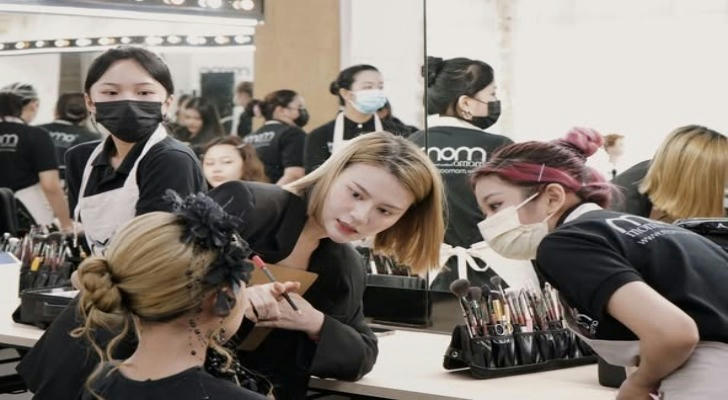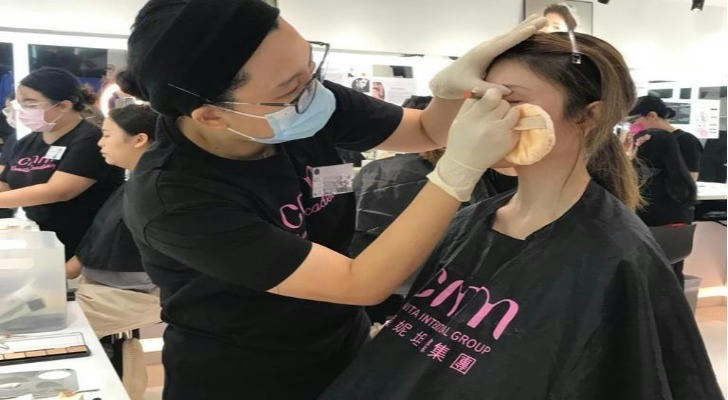Makeup Artist Career Accelerator: From Assistant to Fashion Week Collaborations — Monetizing Your Artistry Pathway
In today's world, where appearance and image are highly valued, the role of a makeup artist has become increasingly important. Whether it's creating the perfect bridal look for a wedding, crafting unique styles for a fashion show, or enhancing the charm of actors in film and television, makeup artists play an indispensable role. If you are passionate about beauty and fashion and aspire to create stunning looks with your own hands, then becoming a professional makeup artist may be the ideal career choice for you. Let's delve into the various aspects of makeup artist training and why it is a career path worth pursuing.

Why Pursue Makeup Artistry Training?
A High-Demand, Essential Profession
Makeup artists are an integral part of the beauty and fashion industry, and the demand for skilled makeup artists continues to grow. From bridal makeup to fashion shows and film and television, the need for makeup artists is consistently high.
With the rise of social media and the expansion of the beauty industry, the demand for makeup artists has never been greater. The industry's growth is projected to continue, making this a secure and future-proof career choice.
Hands-On, Practical Skills
Unlike many office-based jobs, the work of a makeup artist is highly hands-on. Training programs emphasize practical experience, allowing you to work directly with makeup products, tools, and clients. Whether you're creating a natural look for a wedding or a dramatic look for a fashion show, each task brings a sense of accomplishment and creativity.
Learning makeup artistry is not just about applying makeup; it's about understanding different skin types, colors, and techniques to enhance beauty. The more hands-on experience you gain, the more confident you'll become in handling real-world makeup projects.
What You’ll Learn in Makeup Artistry Training
Makeup Theory and Safety
The foundation of any good training program is makeup theory. You’ll learn about:
- Skin Types and Colors: How to match makeup to different skin tones and types.
- Product Knowledge: Understanding the ingredients and uses of various makeup products.
- Sanitation and Hygiene: Ensuring compliance with health regulations to prevent infections.
- Tools and Brushes: Using the right tools for different makeup applications.

Safety is a major component of makeup training, as working with makeup carries inherent risks. A proper training program will teach you how to minimize hazards and ensure a safe working environment.
Application and Technique
A significant part of makeup training focuses on the practical skills needed for makeup application. You’ll learn:
- Reading Client Briefs: Understanding client requirements and preferences.
- Foundation and Concealer Application: The fundamentals of creating a flawless base.
- Eye and Lip Makeup: Techniques for enhancing eyes and lips.
- Contouring and Highlighting: Creating dimension and enhancing facial features.
By working with real clients during training, you’ll develop the confidence to handle makeup applications efficiently and creatively.
Troubleshooting and Maintenance
To ensure longevity and client satisfaction, makeup requires ongoing maintenance. Training will cover how to:
- Identify and Fix Common Makeup Issues: Diagnosing and correcting smudging, fading, and uneven application.
- Use Diagnostic Tools: Learning to work with color charts and lighting to ensure perfect application.
- Perform Preventative Maintenance: Checking products for expiration and potential issues before they cause problems.
- Work with Different Skin Conditions: Troubleshooting acne, dryness, and other skin issues.
Career Opportunities for Makeup Artists
After completing makeup training, a variety of career paths become available, including:
- Freelance Makeup Artist: Working with clients on a project-by-project basis.
- Bridal Makeup Artist: Specializing in wedding makeup.
- Fashion Makeup Artist: Working on fashion shows and editorials.
- Film and Television Makeup Artist: Creating looks for actors and actresses.
- Beauty Consultant: Advising clients on makeup and skincare products.
Makeup artists also have the opportunity to work in salons, spas, or even start their own businesses, giving them control over their career growth and earnings.
How to Get Started
To begin a career in makeup artistry, look for a training program that combines classroom learning with hands-on experience. Many beauty schools, vocational colleges, and apprenticeship programs offer structured training that covers both foundational knowledge and practical application.
Some key factors to consider when choosing a program:
- Accreditation: Ensure the program is recognized by industry standards.
- Hands-On Training: Look for programs that offer real-world practice with makeup products and clients.
- Pathway to Certification: Many programs prepare you for licensing exams required to work as a makeup artist.
- Job Placement Assistance: Some programs help graduates find apprenticeships or entry-level positions.
Summary
Makeup artistry training is an excellent investment in a career that offers stability, growth, and high demand. Whether you’re interested in bridal makeup, fashion, or film and television, mastering this trade opens the door to numerous opportunities. The beauty industry is constantly evolving, and with the right training, you can be at the forefront of this exciting field.
